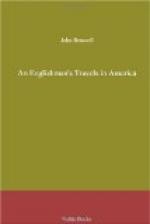After a fatiguing journey, for which I was at the time almost totally unfitted by ill-health, our party reached Fort Andrews, with the mangled remains of the victim. A short time afterwards these were committed to the sand, a military salute being fired over the grave by some soldiers at the garrison. On an elevated slab of wood, to the north of Fort Andrews, may be seen a zinc plate, erected by me to the memory of my friend, with his name, the date of his death, and an epitome of the circumstances attending it. This memento of regard has, in all probability, escaped the cupidity of the Indians, for I took the precaution to have it placed as much out of sight as possible, and the place of burial was off the beaten track.
Thus perished miserably, one whose generous openness and manly virtues rendered him dear to all who had the privilege of his acquaintance. He was a native of somewhere near Arbroath in Scotland, but his accent did not betray his nativity.
In traversing the sandy deserts of West Florida, I had frequent opportunities of tracing the devastating effects of those awful visitations in tropical climates—hurricanes, or tornadoes; and, notwithstanding I had the good fortune to escape the danger of being exposed to one, I more than once prepared for the worst. One of these was accompanied with phenomena so unusual and striking to a native of Europe, that I must not omit some notice of it, if for no other purpose than to convey to the mind of the reader one of the many unpleasant but wonderful accompaniments of a residence in these latitudes, so poetically, and indeed so truthfully, apostrophized as “the sunny south.”
It was while on a journey (accompanied by two yeomen from East Florida, who were proceeding to join an expedition against the Indians to defend their hearths, and by the friend whose melancholy loss I have adverted to) from Deadman’s Bay towards Tallahassee, that the occurrence I am about to mention took place It was in the height of summer, and for several days Fahrenheit’s barometer had ranged from 84 to 90 degrees, the temperature being occasionally even higher, by some degrees, than this. We started soon after eight in the morning, and had ridden all day under a scorching sun, from the effects of which we were but ill-defended by our palm-leaf hats, for our heads were aching intensely—my own being, in common parlance, “ready to split,” not an inapt simile, by the way, as I often experienced in the south. Towards evening, the sultriness increased to a great degree, and respiration became painful, from the closeness of the atmosphere. A suspicious lull soon after succeeded, and we momentarily expected the storm to overtake us. It was not, however, one that was to be relieved by an ordinary discharge of thunder, lightning, and rain—deeper causes being evidently at work. The denseness of the air was accompanied by a semi-darkness, similar to that which prevails during an eclipse of the sun, which luminary, on the occasion I refer to, after all day emitting a lurid glare, was so shrouded in vapour as to be scarcely discernible, even in outline—while a subterranean noise added to the terrors of our situation, which strongly called to mind the accounts we read of earthquakes and similar phenomena.




